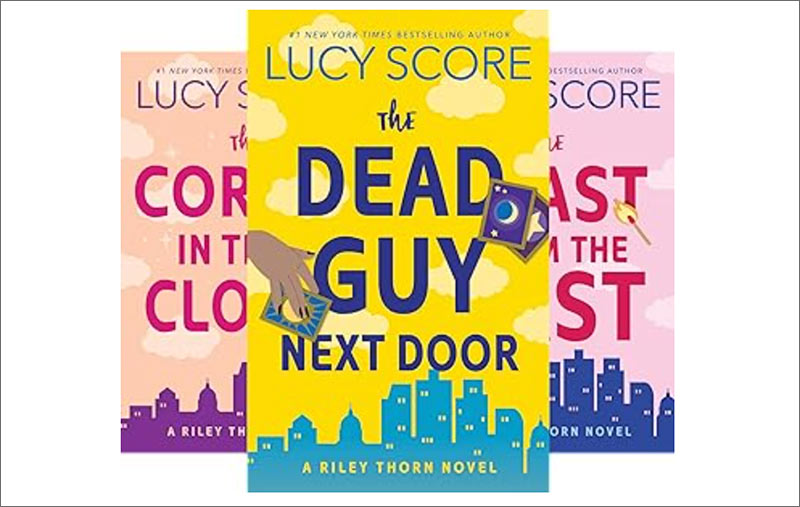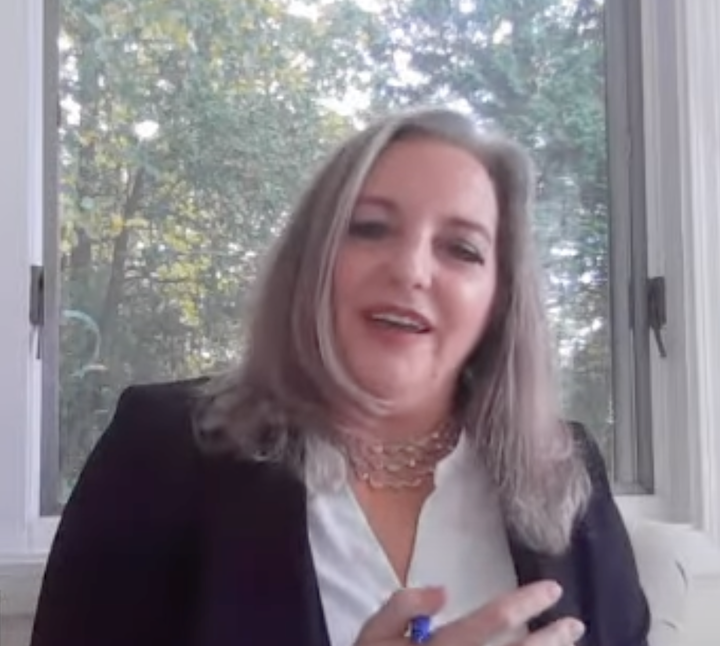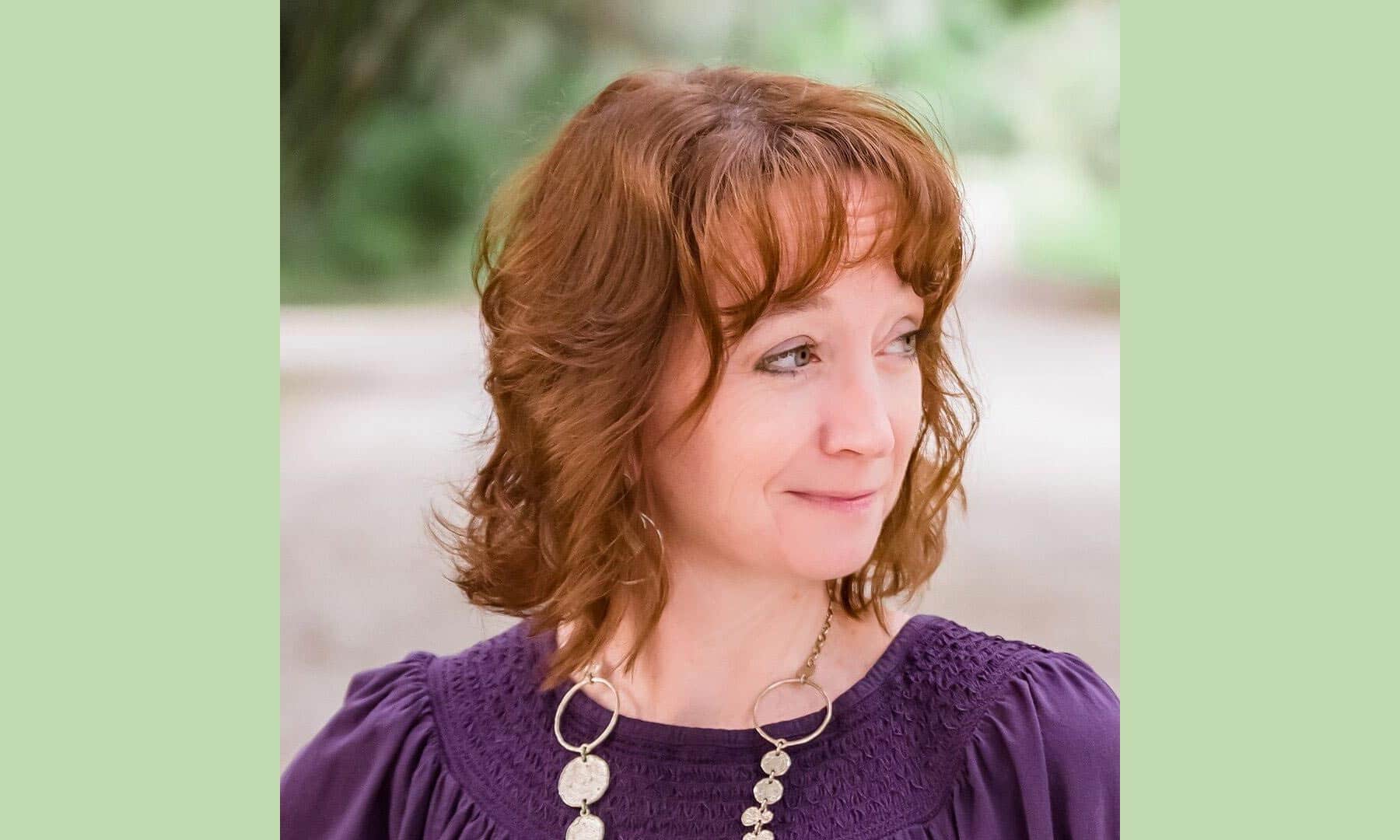In our 75th First Draft Friday, I was joined by New York Times bestselling author Lucy Score, who shared her passion for adding humor to her novels to enliven her stories and make her storylines more engaging for readers to experience.
Here are some key takeaways from my conversation with Lucy:
1. Draw from personal experience: Lucy’s journey into writing began with humor columns in her local newspaper during her teenage years. Inspired by comedic legends like Dave Barry and Erma Bombeck, she honed her skills in crafting witty and humorous content. Drawing from personal experiences and embracing your natural comedic tendencies can infuse authenticity into your writing.
2. Embrace banter and dialogue: One of Lucy’s favorite ways to weave humor into her stories is through banter and dialogue between characters. Whether it’s siblings exchanging playful insults or enemies engaging in witty repartee, humorous interactions between characters can add depth and entertainment to your narrative.
3. Use creative insults: Get inventive with insults! Lucy suggests brainstorming humorous insults that suit your characters’ personalities and situations. Injecting creativity into your characters’ verbal exchanges can elevate the comedic impact and keep readers engaged.
4. Use secondary characters: Secondary characters can serve as comedic foils to your main characters, providing opportunities for humor through their quirks and interactions. Lucy often uses eccentric secondary characters to create chaos and comedic relief, adding layers of humor to her stories.
5. Balance humor with serious themes: While humor is a powerful tool, it’s essential to balance it with the overall tone and themes of your story. Lucy integrates humor into suspenseful or serious situations to make the storylines easier and safer for readers to experience.
It was a great discussion, one you won’t want to miss! Click below to watch our 30-minute session and hear the questions we answered from the live audience. Keep scrolling if you’d prefer to read the transcript.
More info:
Try out Marlowe, our A.I., for a critique of your novel: authors.ai/marlowe/
Check out Lucy Score’s books on BingeBooks.
Enjoy the show? Check out our upcoming and past First Draft Friday episodes.
TRANSCRIPT:
Alessandra Torre: Hello everyone, and welcome to another First Draft Friday. This is episode number 75. I am your host with Authors AI. My name is Alessandra Torre and I am joined today by number one New York Times bestselling author Lucy Score. Welcome, Lucy. It’s so great to have you here. I’m so excited for this topic. And for everyone joining us today. Today we are going to be doing another live author chat, and this one is all about how to add humor to romance and suspense writing. So really what we’re gonna be talking about could be applied to really any fiction genre. So I see everyone joining us from YouTube and Facebook. Don’t be shy. The comment section is all yours. If you have any questions for Lucy, pop them in the chat. We’ll answer as many questions as we can during the next half hour. But without further ado, Lucy, do you want to introduce yourself to the audience and tell us just a little bit about what you write?
Lucy Score: Hi, guys. I’m Lucy, thank you for having me. I’m super excited to be here. I always love to chat with you, Alessandra!
Alessandra Torre: I know. I’m excited.
Lucy Score: I am a contemporary romance writer and I have been writing full time since 2015. So I’m coming up on my 10-year anniversary, which is crazy.
Alessandra Torre: It’s crazy. Several comments in social media about loving the new hair. Which was the first thing that I said to Lucy. Yeah, when she came on. So it’s so great to see everybody here and to have you here. So before we start talking specifically about humor, can you tell us how you got started a decade ago and did you get started immediately writing funny stories or where did you begin?
Lucy Score: Well, okay. So I don’t think I’ve really ever talked about this part of my origin story before, but when I was 16 my local newspaper opened up a program for teenagers, and at the time I wanted to be the next Lois Lane, so I joined. I was really influenced by The Adventures of Superman with Dean Cain and Teri Hatcher. I was like, I’m going to be Lois. So I joined this program, and every week we would alternate, like there was a news story, a feature, a column, a music review. So some kind of review. And I went crazy for writing humor columns. I was a huge Dave Barry and Erma Bombeck fan and just every time I got to write a column, I was so excited and I could just be my goofy self. And I did that, I think, for about two years before I went to college and I really enjoyed it. And I think that kind of stuck with me. So everything that I’ve ever written, including college essays, has an element of humor in it. Just because I feel like that’s my comfort zone.
Alessandra Torre: Yeah. And you’re. I mean, you’re a funny person by nature.
Lucy Score: I am! I’m hilarious.
Alessandra Torre: You are hilarious. So where were you in life a decade ago? Like, what was your career path? Did you go to college to write or?
Lucy Score: I went, I went to college for journalism, which was way, way more than a decade ago.
Lucy Score: But ten years ago, I was working full time in marketing for an accounting firm. And I wasn’t very good at it, so on my nights and weekends, I would escape from this job that I wasn’t very good at, and I would write steamy stuff. And finally, one of those, you know, it evolved into my first book, thankfully.
Alessandra Torre: And what was that very first book?
Lucy Score: Undercover Love. Yeah. It was originally a novella that I called Cocktails at Seven, and it became my first book, Undercover Love. That was published in March of 2015. And then, it was a good thing that I went down that path because in October of 2015, my second book came out and I got fired.
Alessandra Torre: Oh. Oops.
Lucy Score: So, I mean, it worked out for the best for everybody. Especially my previous employer who got to hire someone who was actually really good at the job. But also, it worked out pretty well for me.
Alessandra Torre: Did you start looking for another job or that was the moment where you said I’m going to give this writing thing a go. I’m going to do this full time.
Lucy Score: I had 24 hours of full-on panic because at this point, I knew that I was not a good fit for any kind of job that an actual adult could hold down and excel at. So I had this five-year plan that I was going to save for five years, until I had one year of salary saved up and put in the bank, and I was going to give myself a year trying to support myself as an author. And so that was my plan. I was really excited about that plan. And, I was let go the day before my second book came out, and I was devastated. I was like, oh my gosh, this derails everything. I’m going to have to start working on my resume again. I’m gonna have to find another job. But my second book did well enough that in the first month I actually earned my annual salary. So I was able to stay a full-time author at that point. So I was really excited and very, very happy with how things worked out.
Alessandra Torre: And did those first books have an element of suspense in the mystery? I mean, in the romance?
Lucy Score: A lot, yeah, both of them did. And I definitely like to weave suspense elements into contemporary romance because I, you know, I know you write some mystery thriller things as well, and I just there’s something so much fun about weaving in this external conflict. It kind of keeps my brain fresh. Like, it’s not constantly like, okay, the hero and heroine just had a fight, and now they’re broken up. It’s now somebody got kidnaped or.
Alessandra Torre: It puts pressure. I’m the same way. I get. I don’t want to say I get bored, but it’s much easier to propel the story forward if there is also something else going on other than just will this couple get back together? Because so often in romance, we kind of know that they will, you know. So it takes a lot of the guesswork or the suspense out of it. Someone asked on Facebook, Lynn said, what was the name of your second book?
Lucy Score: Pretend You’re Mine. I see my sister in the comments. Hi, Madison.
Alessandra Torre: Yeah, she said, that humor is definitely not a coping mechanism for your family.
Lucy Score: Not at all. Yeah.
Alessandra Torre: And we have another question from Facebook. They said, Lucy, I love the humor in your book, especially when you write brothers. Knox and Nash and the Pierce brothers make me smile and laugh. How do you do that? It brings so much joy. So that’s a great transition to us talking about humor and adding humor to your stories. Does it make it easier when there are siblings involved? Like, and there’s a family dynamic or.
Lucy Score: There’s to me, I think. One of my favorite ways to weave in humor is through banter. My brother and sister are two of the funniest people I know, so our conversations are at all times ridiculous. Whenever someone new is in the room with the three of us, they’re just at a loss for words because there are three of us, and we’re hilarious and very intense. So I love to recreate that dynamic in fiction. I like doing it with siblings, but I also really love pitting enemies against each other. So every time they’re on the page together, they’re fighting about something, but they’re fighting in a very funny way. It keeps me entertained when I’m writing it.

“The Dead Guy Next Door”: an anti-bromance romance novel.
Alessandra Torre: Maybe this is hard for you to describe your process, but, like, how do you… How would I make a fight funny? Like, are they griping at each other good naturedly or not?
Lucy Score: Sometimes not. I think the insults, if you get creative with the insults. In The Dead Guy Next Door, I have what I call an anti-bromance. So the hero, Nick, is really grumpy and he does not know how to have healthy relationships with other men. So there are two other male characters in the story that every time he’s in a scene with them, they’re constantly just bickering. The one guy that he doesn’t like is very, very tall and very muscular, and he says something like, don’t make me go get a step stool, climb up it and slap you across the face. You know, it’s just it’s. I have a lot of fun coming up with these insults that just fly back and forth. Just like I guess siblings would do.
Alessandra Torre: So do you ever like when you’re writing stop and think like, what would be a great insult?
Lucy Score: Oh my god, yes! I write in sprints. So I will set a timer and the only thing I’m allowed to do is write. So if I can’t come up with something within like 10-20 seconds, I leave a note for myself and I’m like, insert a funny insult about this. That’s my game plan. So then it becomes Future Lucy’s problem. But usually, future Lucy is less stressed about word count and more creative.
Alessandra Torre: Takes the pressure off. So let’s talk about a typical Lucy Score book. Your books are long. And I don’t mean that in a bad way, but your books are meaty. Yeah. So typically you’re like 150,000 words? And what is your normal?
Lucy Score: Yeah. Yeah. 150,000 is a fair estimate. I was gonna say The Things We Left Behind was 172,000. That was my most recent one. And I was like I cannot write another book that long. And now the one I’m working on is like, we were just talking before we went live. Yeah. This one’s shaping up.
Alessandra Torre: To be meaty.
Lucy Score: And I’m going to guess this one will be around 160,000 words.
Alessandra Torre: Yeah, it’s not a bad thing. For anyone watching who hasn’t read Lucy before. A great book to start is Dead Guy Next Door which she just showed the cover. And that even the title itself is funny. I mean, it obviously is serious. And Elaine said your titles look really serious, so obviously there’s a dead guy, but already I mean, you can’t say that title without feeling a little bit of, you know, lightheartedness.So, can you tell us the elevator pitch of the plot of Dead Guy Next Door.
Lucy Score: Sure. My heroine, Riley, is a reluctant psychic. She comes from a long line of female psychics, and she has no interest in her powers. But she has a vision of her next door neighbor being murdered. So she spends the first part of the book trying to prevent this murder. And she is not successful, obviously by the title. So she lands at the top of the suspect list because she had prior knowledge of this crime, and she is paired up with a handsome, dimpled, tattooed private investigator who is going to help her clear her name.
Alessandra Torre: I love that. You are obviously dealing with serious subject matter, but, you know, how do you balance the humor and, you know, kind of like actual suspenseful moments in that book? Are there ever times where you have to say, OK, let me dial this back. Do your editors ever go, this is not the time for this?
Lucy Score: My poor editors. I think the Riley Thorne series, for me, is special because I just let myself go. I let the story be as zany. I let the characters be as wacky as they want to be. I don’t pull any punches. I let it be absolute madcap chaos. With my contemporary romances that have some romantic suspense. I do have to dial it back a little bit, because I need the reader to feel some of the stress of the danger, but I still inject humor into those storylines because I think. For me, I’m a really sensitive intake person. You know, I’m very easily influenced by content. I spent one beach vacation reading the entire Hunger Games series. It was the most depressing beach vacation that I ever had. The books were brilliant, the writing was amazing, I was so depressed. So I think I always. Humor is definitely a coping mechanism, as my sister said, and I think I use that to make these storylines safer for readers to experience. So in Dead Guy Next Door there are murders all over the place. But they’re funny murders. In my
Alessandra Torre: Wait. What’s a funny murder?
Lucy Score: You know, maybe it’s somebody who deserved it.
Alessandra Torre: Like they die in a funny way or what?
Lucy Score: I mean, nobody’s really sad that they’re gone. The murder victim in Dead Guy Next Door. Nobody was sad to see him go. He. Yeah, he was gross. And he was not a nice person. So it was. It was okay. And he went in a funny way. And so it’s safer for the reader to experience that with the humor mixed in. I promise, I really do take things seriously in life, especially, you know, murder and things like that. But on the page, I have a little bit of fun with it.
Alessandra Torre: That makes perfect sense. Okay, we have a few questions. Nikki from Facebook said, do you keep a book of insults?
Lucy Score: No, but that would be really smart. I, you know, I don’t know about you guys, but I’m the person who, if I’m ever in a verbal confrontation, I clam up. I don’t have any zingers. I don’t have any clapbacks. And then that night in the shower, I’ll be like, I should have said this. Oh, I would have said this. So that’s on the page is when I can give myself a beat to come up with something good. So a lot of this stuff is things that I wish I would have said in an actual conversation.
Alessandra Torre: Are your characters always like, instantly witty, or are there times where, like, your heroine is tongue tied and like has that same thing, like later where they’re like, oh, this is what I should have said, or, you know, like I’ve got nothing.
Lucy Score: It’s funny you ask because usually they’re very quick witted, but the heroine I’m working on now, which I will give no details, when she gets anxious, she tells bad ‘your mom’ jokes. Or someone’s like stop freaking out. She’s like, your mom’s freaking out. So that’s that’s very that’s kind of like a me thing. My instinct is to say something really dumb and not at all helpful.
Alessandra Torre: Another question. This one from YouTube. Deane said, how do you keep from getting bored with stories that long?
Lucy Score: Oh my gosh. See, that’s my problem. I’m the opposite of bored. I am fascinated by every aspect of storytelling, so to me, it is never just how is this guy going to get this girl? It is never even remotely that simple. I want to know every single character’s character arc. What do they want? What’s keeping them from having it? What do they need? How are they standing in their own way? What are the themes of the book? How are the themes messing with the character arc? How are these two characters keeping each other from what they need? I feel like every character is real to me. So every secondary character I have in my book bible. I include how they sound. How old are they? What’s their job? How many pets do they have? What are their pets’ names? What kind of car do they drive? They become these real people to me. And they don’t just exist to move the story forward. So I just find storytelling so fascinating and I keep getting deeper and deeper into it. And I think that’s what’s making my books longer, because I’m learning more about the craft of storytelling all the time. And I keep trying to do better than the last story that I told. If I’m writing and I’m in a scene that’s boring me, there’s something wrong with that scene and I will skip it and move on to something else. Or I will ask myself, you know, if I’m bored, the reader is going to be bored. So what purpose is this scene serving and how do I make it more interesting?
Alessandra Torre: And are you a pantser or are you an outliner?
Lucy Score: Both. I start with an outline that I think is really good and detailed, and I’m like, oh, I’m going to nail this. And then I start writing, and that’s when the rest of the story reveals it. I will outline for a 100,000-word book and end up with 160,000-word book.
Alessandra Torre: Well, you answered, in the course of that, Angelea’s question, do you keep a character bible? So you can keep a character Bible and you say you know everything about every character. Like, would you have like 40 or 50 characters in this character bible if you have a series or is it just the major ones?
Lucy Score: I have more. Every character mentioned in the book gets put into the character bible. The first column is like a description of their voice for the audio narrators, so they know how the character sounds in my head. But yeah, everybody who gets mentioned, everything I write about them goes into that bible because I guarantee you I’m going to go to chapter 50 and I’m going to be like, oh, I’m going to add in the neighbor from chapter two, what color hair did she have, what color, what was what kind of car was she driving? So at least that way I have the information available to me, rather than having to scroll back and try to figure it out.
Alessandra Torre: And is this bible like, physical or is this on your computer?
Lucy Score: It’s it’s, on my computer. Yeah. Okay. It’s an Excel spreadsheet. So every book that I write gets one, and then, I build, like, if it’s a series the bible just keeps getting longer and longer.
Alessandra Torre: I love that. Christina says out of all of the books you’ve written, which one is your favorite?
Lucy Score: I don’t know. Which one was your favorite, Christina?
Alessandra Torre: Are they all your favorite at the time you wrote, or are you sick of the book by the time you’re done? And yeah.
Lucy Score: Yeah, I definitely hit that point with every book, which I think is a good thing, because otherwise I would spend forever just tweaking it and trying to make it perfect.
Alessandra Torre: Yeah.
Lucy Score: I’m not a perfectionist in that sense, so I will work on it until I’m happy with the story. And by the time I’m happy with the story, I’m so sick of it. I never want to see it again. So that’s how I know. I’m like, okay, this book is ready to go. It’s going out. And then by the time edits come back, then I can enjoy it again. But there is a point every time where I’m like, I cannot stand this book. Are you like that?
Alessandra Torre: 100% And then normally, at that level, it’s when it’s time to listen to the audiobook and I’m like, I can’t do it. Like I just, I can’t and then you have to listen multiple times!
Alessandra Torre: And I can’t do it! I have a mental breakdown around that time where I just sob into the corner.
Lucy Score: It is really tough. It is. It is ridiculous.
Alessandra Torre: Yeah. And talking about audiobooks and you mentioned, like, you have a narrator. One thing that I found is hard is you really have to get a narrator who understands your humor because a character can say a line in five different ways, the same line, you know, and one way it’s funny and another way it is rude. You know? And it all depends, especially if you have kind of snarky humor. So that’s that, that a problem in the past or do you
Lucy Score: I learned really fast, really early on in my audio production that I didn’t want narrators who just read the story. I wanted voice actors who would perform the story. And that made a huge difference. And I, you know, I’m a creature of habit. So I work with the same narrators over and over again. And, they just get me and they get my vibe. I would, I would actually panic over the idea of trying to break in somebody new at this point. But, Lila Winters is amazing. The way she performs my heroine’s dialogue is the way it sounds in my head. And I don’t have to be like, “Actually, Lila, it sounds more like this.” I’m able to give her the freedom to perform it because she can add more to it than just, you know, putting her own spin on things. She’s really, like, bringing the characters to life. So I love that about her.
Alessandra Torre: I love that, yeah. I had a narrator once who made my funny, cute, quirky girl sound like just the most horrible person by the end of the book because every line was said with such venom. Like she’s a nice person. Like she’s funny!
Lucy Score: That is so stressful.
Alessandra Torre: Mariana said anything more you can tell us about the 2025 project you mentioned in your newsletter, the small-town rom-com?
Lucy Score: It’s currently 95,000 words long, and the heroine tells ‘your mom’ jokes when she’s nervous.
Alessandra Torre: That you’re working on right now.
Lucy Score: Yeah, I am really protective of the stories when I’m working on them because I feel like they’re all locked up inside me, and I don’t want anything interfering with it. And I also part of me just loves trolling my beautiful readers and making them excited for it.
Alessandra Torre: and torturing them.
Lucy Score: Torturing you guys because I love you. I love you so much. So of course I’m going to torture you. But another reason why I don’t talk much about what I’m working on is because so much changes. I was that 80,000 words in this book, and I realized this big, huge thing that I had built my heroine’s character arc around wasn’t going to work. And I was like, I went out. I went out to the kitchen. It was like 7:00 at night, and I went out and I’m just standing there like that hunchback and Mr. Lucy comes in. He’s like, what’s wrong? I’m like Blah blah, blah, blah, blah. I mean, and he’s so used to it, he’s like, “It’s OK.” He’s like, it’s part of your process and it’s so true. I envy other authors who have a much more linear process where they know where the story is going from the beginning. And it’s like me every time I get into the middle of the book. And then I’m like, oh, that’s what it’s about, okay. And, I don’t know if this is the same for you. I find that when I plan, I overcomplicate them way too much. So when I actually start writing these scenes, then I’m like, okay, she doesn’t need six motivations for why this or why she did this. Yeah.
Alessandra Torre: Yeah, 100%. Okay, so we have four minutes left. And I have a few questions about writing funny. So the first is you seem as if you were born funny. You know what I mean? You’re born into a funny family. So do you think an author can become better at writing funny? Or do you think a non-funny individual can write humor? Or do you think that a lot of what you do is just kind of innately you think funny, you are funny in real life and you write a funny scene?
Lucy Score: I think it’s, I think it’s a combination of both. I think you can be, like, innately funny. Like me. And it just comes naturally, and it’s great, but I, you know, I still have to work at it and hone it to character standards. I think anybody can be taught to do anything. I don’t know if you can be taught to do anything at an expert level, but I do believe that you can study and practice and learn how to become proficient at something. So I think, you know, if you’re not a super funny person, I think studying things and people and artists that you find funny or entertaining, I think that will help lead you on the path.
Alessandra Torre: Yeah. And I do think, I mean, there’s so much we don’t know. Like comedians practice their art. I have a friend who’s a stand-up comedian and I listen to him, like, practice and try different things. He approaches things a different way. And it was a really interesting process for me. So when you’re looking at a murder and you’re like, oh, I need a funny murder. Like, are there times where you think, oh, he’ll pass away this way? Then you think, oh no, better if you passed away this way. How much editorial tweaking do you do to make your book in your scenes and your situations funnier?
Lucy Score: There are a lot. I mean, I will start out with, you know, this is what needs to happen in the scene. And this is why. What is this scene accomplishing? And usually, I don’t have a lot of humor in that skeletal outline of the scene, but once I get into it, if I find myself getting a little bored, I’m like, okay. I use the secondary characters in the Riley Thorne series all the time. Riley lives with a bunch of elderly people in a crumbling mansion in Harrisburg, and so all of her roommates are over the age of, like, 75, and they are all creating their own brand of chaos. So I can see this murder just took place, and then Riley accidentally falls down the stairs tackling who she thinks is the murderer. So you can use the situation. You can use the environment. You can use the other characters to all up the ante on the comedy that’s happening. Riley herself, Riley Thorne is not a very funny person. She’s like the straight person in this cast of characters who are absolutely hilarious.
Alessandra Torre: I think this is a brilliant question. Do you think if you stripped all dialogue from your book, where would the funny level be? Like, if right now you’re at 100% funny and you took all the dialogue out of your book, do you think there’s still like 20% funny just from like the situations and the instances? Or do you think that a vast majority of your funny comes through dialogue?
Lucy Score: For sure. The vast majority is dialogue. There are still funny situations, but I think the humor that people connect with is mostly in the interactions between the characters. So yeah, I think if we took all the dialog out. There would be a chuckle here and there, but it’s really the way the characters interact with each other that brings it home.
Alessandra Torre: Yeah. Tammy said, consider flatulence when you answer this. So. So we have funny people watching, too. I love this. This is such a fantastic Friday chat.
Lucy Score: I love that. So if someone watching is trying to improve and up their humor game, maybe also studying humor, like a great way to do it is to read other authors that are good at this. If you read Megan Quinn, if you read Jana Aston and pay attention like, specifically, what is it that made this funny? Why am I smiling? And I think, yeah, dialogue is a lot of that.
Alessandra Torre: inner dialogue, also?
Lucy Score: Oh yeah. Yeah definitely. Some of my inner dialogue is funnier than what comes out of the character’s mouth.
Alessandra Torre: I love that. And as a psychic, she can’t hear what other people like… what? she sees things?
Lucy Score: She is actually like a mega psychic so she can see the future. Sometimes. She gets messages from people who have passed on and she can also, if she’s not guarding herself, she can also kind of hear what other people are thinking. So other people’s inner thoughts are.
Alessandra Torre: Love that. Yeah, I can’t wait. All right. So the next book in this series, this is the Dead Guy Next Door, the Riley Thorne series, the next book in the series comes out July 16th, and it’s called Body in the Backyard. And the cover reveal is today? Do you have it on your phone?
Lucy Score: Let me see if I can bring it up.
Alessandra Torre: All right. And, so for everyone watching, if you haven’t yet dove into the series, now is the perfect time. They are meaty books. You can enjoy them now. And there’s Body in the Backyard, so it’s around the corner. But it’s the perfect time now to jump into Book One. Dead Guy Next Door. Yeah. And then re-read through.
Lucy Score: Yes, please.
Alessandra Torre: All right. Well, thank you so much, Lucy. It’s fantastic to have you. And thank you to everyone who joined us. You guys were amazing, Lucy, of course, you’re always amazing. And if you’re interested in more First Draft Friday chats we’re here every other week. And we’d love to see you at a future chat. Thank you so much, Lucy. I hope you have a fantastic weekend. And, and best of luck with your work in progress.
Lucy Score: Thank you. Thanks for having me. I had a great time.
Alessandra Torre: Absolutely. Bye, guys.






